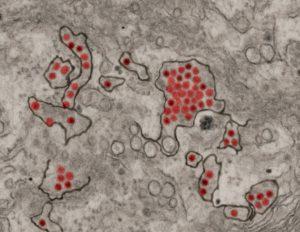Pregnant women are particularly susceptible to symptomatic Zika virus (ZIKV) infection and the virus has the ability to affect the developing fetus, resulting in a host of fetal abnormalities. Researchers from Cincinnati Children’s Hospital found that asymptomatic ZIKV infection protects from re-infection with the virus and these benefits of asymptomatic infection are still present during pregnancy.
ZIKV infection in people who are not pregnant usually results in asymptomatic infection or one with minimal symptoms. However, the infection in pregnant women may result in fetal death, microcephaly and other effects on the fetuses and infants born to these women. Pregnant women usually have higher viral loads than non-pregnant individuals after ZIKV infection. As ZIKV morbidity is more severe in pregnant women, understanding how to protect this population from infection is of great public health importance.
This led researchers to study whether primary, preconceptual ZIKV infection results in protection from subsequent infection. To do this, the researchers used genetically discordant inbred mice.
The researchers found that asymptomatic infection primed the immune response to ZIKV and protected the mice from re-infection when they were pregnant. Both maternal and fetal tissue were less susceptible to secondary infection after asymptomatic ZIKV infection. The team found that this protection was through circulating neutralizing antibodies.
The results of this study may help identify pregnant women who are most at risk of getting ZIKV – those without the protective antibody responses. One of the next steps of this study could be to determine the antibody threshold needed to protect against symptomatic ZIKV infection.
Journal article: Turner et al., 2017. Preconceptual Zika virus asymptomatic infection protects against secondary prenatal infection. PlosPathogens
Article by Thandeka Moyo












